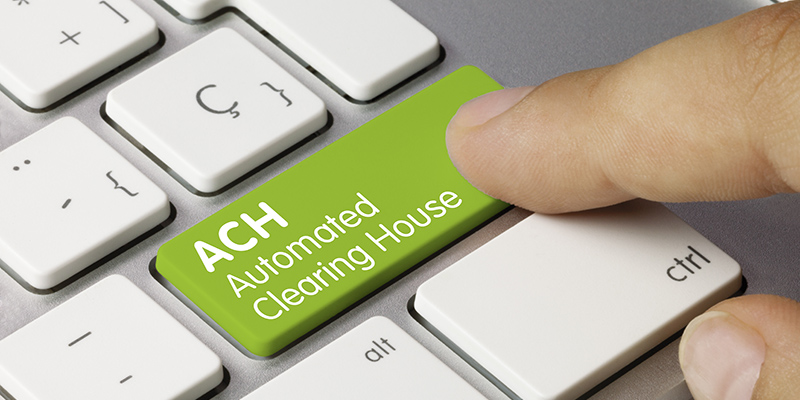There are many homeowners associations that accept ACH payments for HOA dues. But, that does not mean it is the right choice for everyone. Should yours do the same?
The Thing About ACH Payments for HOA Dues
Paying dues is a common pain point among homeowners living in HOA-run communities. Although there are some that use a quarterly or annual setup, homeowners association payments are typically made on a monthly basis. This makes both making and collecting payments a bit of a chore, especially if you still use physical checks. Homeowners must mail in their checks, while board members must deposit the checks every month.
To make payments more convenient for everyone, many associations have turned to electronic methods such as ACH. What are ACH payments? ACH, which stands for “automated clearing house,” is a method that processes transactions between financial institutions with the help of an electronic network.
Here are some key traits you must know about ACH payments:
- They work with both direct debit and credit transfers.
- There are different processing times, playing in the range of 2-5 days.
- They typically come with transaction fees, though lower than standard credit and debit card transactions.
- Billing still requires authorization.
Can Your HOA Require ACH Payments for HOA Fees?
ACH payments are relatively easy to set up. All you need to do is coordinate with your bank and obtain certain bank information from homeowners.
The problem, though, does not lie in whether or not you should accept ACH payments for HOA dues. Given how convenient they are, if owners want to pay using ACH billing, your board should definitely consider making it available. The real problem lies in whether or not you can (or should) require ACH payments.
Making ACH payments mandatory is dangerous territory. Depending on where you live, certain state laws may prohibit an association from forcing owners to use ACH billing. There have also been cases where an HOA would allow owners to pay quarterly if they use ACH but annually if they use traditional checks. Be careful with such a setup because it may not be permitted by state laws or your governing documents.
Additionally, the topic of ACH payments naturally brings up security concerns. Homeowners may feel unsure about giving their bank information to the HOA if there are no security measures in place. All in all, requiring ACH payments is not a good idea, though you can consult your attorney to go through your options.
The Rise of Money-Transfer Apps
 Technology has made it significantly easier to transfer money from one account to another. Money-transfer apps, in particular, have gained popularity because of their lower fees, ease of use, accessibility, and speedy transfers. But, can an HOA use money-transfer apps like PayPal and Venmo to collect dues?
Technology has made it significantly easier to transfer money from one account to another. Money-transfer apps, in particular, have gained popularity because of their lower fees, ease of use, accessibility, and speedy transfers. But, can an HOA use money-transfer apps like PayPal and Venmo to collect dues?
It depends on where you are. State laws and your governing documents may or may not allow it. Even if your association is permitted to use money-transfer apps, there are a few points of concern you must address.
Surcharge and Transaction Fees
Many money-transfer apps charge fees either for each transaction or as a regular subscription. It is important to establish who will shoulder these fees — the HOA or the homeowner. If the HOA will pay it, then you won’t get the full dues amount. On the other hand, you may face opposition from owners who refuse to cover the transaction fee, which they may view as an additional cost on their part.
Security
As with ACH payments for homeowners association dues, money-transfer apps can also have problems with security. Accounts can be hacked, and the burden of security rests with a third party (PayPal, Venmo, etc.). Does your HOA board trust the security measures of these apps?
Access
Money-transfer accounts should be controlled by multiple people from the board — not just a single person — to prevent theft. This is true for ACH payments as well. Additionally, if your HOA chooses to use money-transfer apps, make sure to create an account for the association. Never use personal accounts.
Problems with Using Board Members’ Personal Accounts
As touched upon previously, board members must never use their personal bank or money-transfer accounts to collect owner dues. There are many problems that can arise out of using personal accounts.
For one thing, it is not secure. Because only one person has access and control of the account, it is very easy to manipulate the funds. This makes your association vulnerable to fraud and embezzlement. Even if the board member handling the account is very honest, your board should not risk even the perception of impropriety.
There are also some states with laws against this. For instance, in California, Civil Code Section 5380 prohibits commingling association funds with another party’s personal funds. Therefore, your HOA should always have its own association account.
Lastly, there is the issue of continuity. God forbid, if something happens to the person with sole control over the account, the board would have a hard time gaining access to the HOA’s funds. An association account, though, typically requires multiple signatories. But, you should make sure to change signatories when there is a change in board members.
Automating ACH Payments for HOA Dues With Software
If the homeowners in your community are willing to make ACH payments, then you should certainly consider offering it. After all, it is a convenient payment method for everyone involved. You can make it even easier, though, with the help of HOA software.
HOA management software allows owners to link their bank information to their resident accounts. From there, you can process ACH drafts with only a few clicks. Let the software automatically generate a NACHA upload file, which you can submit to your bank to process the payments.
Get With the Times
Given how technology has evolved in the last decade or so, convenience is something that many owners expect in their HOA communities. Electronic methods are the future (and present) of payments. And while you can make use of money-transfer apps (which have their own points of concern), another way is to accept ACH payments for HOA dues. ACH payments tend to have lower fees and can be largely automated with the help of HOA software.
If your homeowners association is in need of the right management software, Condo Manager is the way to go. Aside from ACH drafts, our software comes with a variety of modules designed to help manage communities. Call us today at (800) 626-1267 or contact us online for a free demo.
RELATED ARTICLES:
- What Payment Methods Should Be Made Available For Homeowners?
- Should Early Payments Of HOA Dues Be Encouraged?
- How To Prevent Homeowners Association Fraud



